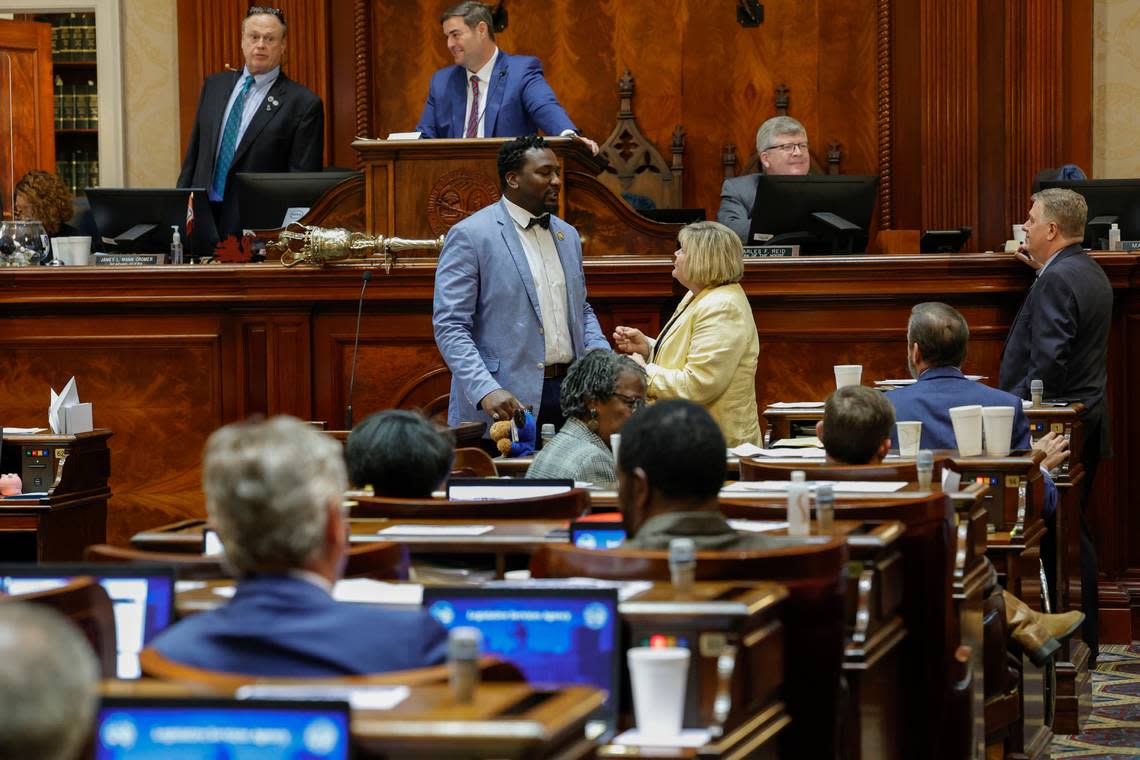Lawsuit challenges $6k voucher for SC parents who send kids to private schools

- Oops!Something went wrong.Please try again later.
A coalition of parents, teachers and public education advocates has asked the state Supreme Court to overturn South Carolina’s new private school voucher law.
The long-anticipated legal challenge, filed Thursday, argues that South Carolina’s plan to subsidize the education of qualified private school students runs afoul of the state Constitution’s “no-aid” clause, which prohibits the direct funding of private and religious schools.
The lawsuit comes roughly six months after the Republican-controlled General Assembly passed a controversial school voucher bill, S. 39, and Gov. Henry McMaster signed it into law.
The ESA law, as it is known, establishes an education scholarship trust fund that grants $6,000 vouchers to qualified families who pull their children out of local public schools and enroll them in private schools or public schools outside of their zoned districts.
School choice proponents support the measure on the grounds it affords parents the freedom to select an education option that best fits their child’s needs. Detractors argue it diverts money from the traditional public school system to prop up unaccountable private schools that won’t actually accept the neediest students.
“Our public schools already lack sufficient resources, so it makes no sense to use school vouchers to divide our limited state funds between public schools and unaccountable private schools,” said Candace Eidson, the parent of a student with special needs in Greenville County. “Unlike public schools, which serve all students, the private schools that receive voucher funds are allowed to choose which students they will serve and can engage in discrimination that would never be allowed in public schools.”
Eidson is one of six South Carolina public school parent plaintiffs who filed the suit in coordination with the South Carolina NAACP and the South Carolina Education Association.
The plaintiffs contend the ESA law violates multiple provisions of the South Carolina Constitution and have asked the state Supreme Court to assume original jurisdiction of the case because of its statewide significance.
In addition to the no-aid clause, they argue it violates the constitutional requirement that the state provide “a system of free public schools open to all children,” allocates public funds without a sufficient public purpose; and impermissibly expands the constitutionally-defined authority of the state superintendent of education, whose Department of Education will administer the program.
“Our constitution reflects a binding commitment that the resources of our state be used to fully fund our public schools, which serve all students,” South Carolina Education Association president Sherry East said in a statement. “Instead of private school vouchers, we should invest in our public schools by reducing class size, addressing the teacher shortage crisis, and increasing parental involvement.”
East’s SCEA was one of several parties that sued McMaster in 2020 over his plan to use $32 million in federal COVID-19 aid to fund tuition grants at private and religious schools.
The South Carolina Supreme Court unanimously struck down that proposal, citing the state Constitution’s no-aid clause.
To avoid a repeat of that decision, Republican legislators crafted their ESA bill to explicitly circumvent the no-aid provision, and have expressed confidence it will survive a legal challenge.
Rather than sending voucher money directly to private and religious schools, as McMaster had proposed, the ESA law gives qualifying parents access to a state-funded account for education expenses of their choice. Indirect funding of private schools is not expressly prohibited by the state Constitution.
S.C. House Education Committee Chairwoman Shannon Erickson, R-Beaufort, who shepherded the bill through the House this past spring, said immediately after its passage that she welcomed a legal challenge.
“I believe that it is fashioned in a way that the funding follows directly what our Constitution would require,” Erickson said. “It does not go to any organization. It goes to a qualified child.”
Not all Republican lawmakers are as confident in the law’s constitutionality.
State Sen. Tom Davis, R-Beaufort, for one, has expressed doubts about its ability to withstand a legal challenge. Davis, a staunch school choice supporter who voted for the ESA bill, has in recent years introduced alternative school voucher legislation that he argues would be on more solid legal footing.
Davis’ bill, known as ACE, or Academic Choice in Education, would fund school vouchers through tax-deductible private donations, similar to South Carolina’s Exceptional SC program.
The state would still pick up the tab for vouchers under Davis’ plan, which cleared the Senate earlier this year, but the funding mechanism would be more indirect and thus more likely to survive a challenge, Davis has argued. The House is expected to take up the ACE bill in the new year.
Republican lawmakers are simultaneously pursuing another option that, if successful, would render moot any debates over the legal intricacies of school voucher funding mechanisms.
House Speaker Murrell Smith, R-Sumter, earlier this year proposed repealing the state Constitution’s no-aid clause that prohibits direct funding of private and religious schools.
Smith’s bill to amend the Constitution passed the House back in February, but has not yet moved in the Senate. To succeed, it will need two-thirds support in the upper chamber and the approval of a majority of voters in the next general election. If voters pass a constitutional amendment to repeal the no-aid clause, the bill would return to the General Assembly for ratification, which requires a simple majority vote.

